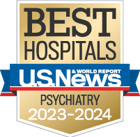We Don’t Just Treat Addiction, We Treat People
We’re ready to talk.
Are you or a loved one struggling with alcohol or drugs? McLean is here to help.
 Substance use disorders are recognized medical conditions and can cause serious problems at work, school, in relationships, and with the law.
Substance use disorders are recognized medical conditions and can cause serious problems at work, school, in relationships, and with the law.
If you or a loved one is misusing alcohol or drugs, McLean’s world-class addiction treatment services provide compassionate care through a range of treatment programs proven to get you started on the road to recovery.
Helping You on the Path to Recovery
Our priority is to help you find your way back to living a healthy and full life.
McLean Hospital provides comprehensive support for individuals who want to reduce dependency and regain control of their lives. Care is provided in a variety of environments to meet the needs of each patient.
The first step is to make sure you or your loved one is safe and secure. Once immediate needs have been addressed, we focus on evaluation and assessment and work with the patient to develop tailored treatment plans optimized for success.
Call us today: 978.464.2331
In His Own Words
Wayne’s addiction to alcohol nearly killed him. Despite unsuccessful attempts at therapy and Alcoholics Anonymous meetings, Wayne finally received the treatment he needed to overcome his addiction.
Wayne shares his journey with alcohol addiction and his care and recovery with the help of McLean’s addiction treatment programs.
Addiction Treatment at McLean
- Evidence-Based Care: Treatment focuses on methodologies proven by research, such as cognitive behavior therapy and integrated group therapy.
- Assessment: Upon admission, each patient is thoroughly evaluated so that clinicians can create customized care plans.
- Group Therapy: Patients participate in our robust group therapy program. This structured environment helps patients work toward recovery.
- Medication Consultation: When indicated, medication can be an important tool for addiction rehab. Patients meet with a psychiatrist as needed.
- Support and Education: Our daily educational curriculum promotes prolonged recovery. Resources are available for patients and their loved ones.
Fernside: Private Setting, Outstanding Care
Fernside, an addiction recovery program, offers exceptional, around-the-clock clinical care that helps individuals build the tools to achieve and maintain abstinence from drugs and alcohol, reclaim a sense of self-worth, and learn to manage the stresses of an active life.
Our self-pay, residential program provides world-class alcohol and drug addiction treatment in the private, charming setting of a renovated country bed and breakfast.
Leaders in Addiction Care
For more than 40 years, McLean Hospital has been providing comprehensive care for patients struggling with substance misuse.
Our Harvard Medical School-affiliated clinicians can help you break the cycle and take control of your life with a range of treatment options proven to help individuals on the path to addiction recovery.
We’re here to help. Contact us now!
Expert Care, Exceptional Outcomes
Stressing recovery and relapse prevention, we utilize a number of therapy models informed by research conducted by investigators throughout McLean Hospital and around the world.
- Relapse prevention therapy is a form of cognitive behavior therapy that incorporates self-control, identifying positive and negative consequences and high-risk situations, and implementing coping strategies in order to help patients maintain abstinence.
- Dialectical behavior therapy (DBT) emphasizes the development of four skill sets: mindfulness, interpersonal effectiveness, emotion regulation, and distress tolerance.
- Motivational enhancement therapy is a counseling approach that helps individuals resolve their ambivalence about engaging in treatment and ceasing drug and alcohol use by evoking rapid and internally motivated change.
- Integrated group therapy is a proven treatment for co-occurring bipolar and substance use disorders—developed by McLean’s Roger D. Weiss, MD, and Hilary S. Connery, MD, PhD—designed to teach essential recovery behaviors and relapse prevention skills that apply to both illnesses.
An Option That’s Right for You
Our addiction treatment programs offer individualized care designed to address the mental, physical, and spiritual components of addictive disorders by integrating evidence-based treatment models with 12-step and other self-help resources.
Customized support helps patients reclaim their independence from addictive substances, learn to manage the stress of an active life without returning to drug and alcohol dependence, and attain personal, career, and recovery goals.
Treatment is provided under the supervision of Harvard Medical School-affiliated clinicians who are experts in substance use disorders and related psychiatric conditions.
We work with you to help you find the tools to return to your family, work, and community. Working together, we make sure you have a support system in place to live a healthy and substance-free life.
Recognizing Addiction
Some of the signs of drug and alcohol misuse are:
- Getting drunk or using drugs on a regular basis
- Lying, especially about the amount one is using or drinking
- Avoiding friends and family members
- Talking or thinking a lot about using drugs or alcohol
- Believing in needing to use or drink to have fun
- Taking excessive risk under the influence of a substance
- Diminishing work performance
- Feeling depressed or hopeless, or having thoughts of self-harm or suicide

